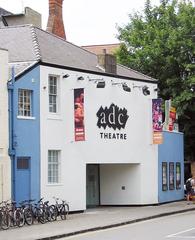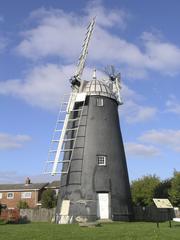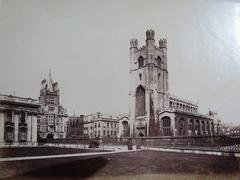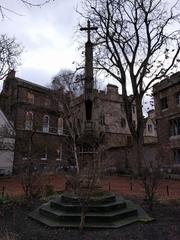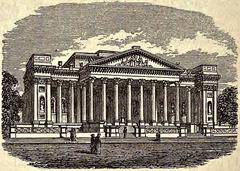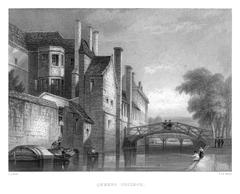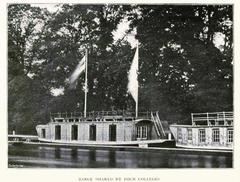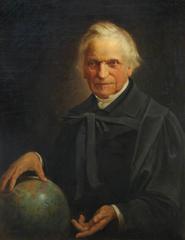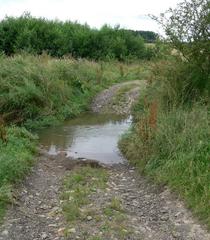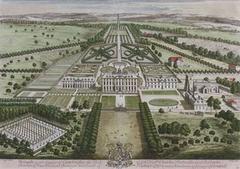Westminster College Cambridge Visiting Hours, Tickets, and Travel Guide
Date: 04/07/2025
Introduction: The Historical and Cultural Significance of Westminster College, Cambridge
Westminster College, Cambridge, stands as a distinguished institution embedded in the rich academic and spiritual heritage of one of the world’s most renowned university cities. Established in the late 19th century to serve the Presbyterian Church of England, it later became a key institution of the United Reformed Church. Its move to Cambridge in 1899—spearheaded by the pioneering twin scholars Margaret and Agnes Smith—situated the college within a vibrant academic landscape whose origins date back to the early 13th century.
Set on Madingley Road, just northwest of Cambridge’s city centre, Westminster College offers visitors an accessible and tranquil environment filled with architectural beauty and historical resonance. The Grade II listed Victorian buildings, exemplifying the Arts and Crafts movement, are a highlight for those interested in ecclesiastical history and design. The college not only delivers theological education but also actively participates in Cambridge’s cultural life, hosting conferences, retreats, public lectures, and maintaining significant archives that document nonconformist religious history in Britain.
Whether you are a history enthusiast, student of theology or architecture, or a cultural traveler, Westminster College provides essential information on visiting hours, ticketing, accessibility, and travel tips to help you plan a memorable and insightful visit (Westminster College Official Website; UniversityRooms.com; BudgetYourTrip.com).
Contents
- Introduction
- Origins and Foundation
- Architectural Heritage
- Academic Role and Affiliation
- The Smith Sisters’ Legacy
- Visiting Information
- Visiting Hours
- Tickets and Entry
- Accessibility
- Location and Travel
- Nearby Attractions
- Role in the Cambridge Community
- Preservation and Relevance
- Visuals and Resources
- Frequently Asked Questions (FAQ)
- Conclusion
Origins and Foundation
Founded in London in 1844 as the Presbyterian Church in England’s theological college, Westminster College was relocated to Cambridge in 1899. This transition was made possible by the philanthropy and advocacy of twin sisters and renowned biblical scholars, Agnes Smith Lewis and Margaret Dunlop Gibson. Their dedication not only secured the site from St John’s College but also shaped the college’s design and ethos. The college honours their legacy with portraits in the dining hall and the preservation of their scholarly collections (universityrooms.com; Cambridge Digital Library).
Architectural Heritage
The college buildings, completed in the early 20th century, are exemplary of the Arts and Crafts movement. The main building, now Grade II listed, has undergone careful modernizations—including a major refurbishment in 2014—while retaining its period character. Visitors can admire the original stonework, stained-glass windows, and intricately designed interiors. The campus includes tranquil gardens, a serene chapel, and the contemporary Woolf Building, blending heritage with modern learning spaces (Westminster College History).
Academic Role and Affiliation
Westminster College has always focused on theological education, initially for the Presbyterian Church of England and, since 1972, as the principal college of the United Reformed Church. It is a founding member of the Cambridge Theological Federation and offers a range of undergraduate and postgraduate programmes validated by Anglia Ruskin University and the University of Cambridge. The college is also home to the Woolf Institute and the Faraday Institute for Science and Religion, making it a centre for ecumenical and interfaith scholarship (Wikipedia).
The Smith Sisters’ Legacy
Agnes Smith Lewis and Margaret Dunlop Gibson’s influence is woven throughout Westminster College. Their achievements as biblical scholars and benefactors are celebrated not only through portraits and archives but also through commemorative scholarships and a lasting commitment to academic excellence. Their story is detailed in Janet Soskice’s book, Sisters of Sinai, and their manuscripts remain a highlight of the college’s special collections (Westminster College History).
Visiting Information
Visiting Hours
Westminster College is primarily an academic and conference venue. Public access is generally limited to special occasions, such as the annual Open Cambridge event. For 2025, the college is open to visitors on Sunday, 15 September, from 10:00 am to 4:00 pm (Open Cambridge Event). Outside of these events, visits are by prior arrangement or as part of organized group tours.
Tickets and Entry
Entry during special events like Open Cambridge is free; however, advance booking is required for guided tours due to limited spaces. In 2025, guided tours will be available at 10:00 am, 11:30 am, and 2:00 pm, led by the college archivist. Book your place in advance via Eventbrite. Self-guided tours are also available with on-site information leaflets.
Accessibility
The college is committed to accessibility, offering step-free access and accessible toilets in modern areas such as the Woolf Building and conference facilities. Some historic areas may be less accessible, so visitors with mobility needs are advised to contact the college in advance for assistance.
Location and Travel
Located at Madingley Road, Cambridge, CB3 0AA, Westminster College is a short walk from the city centre. The area is well served by local buses, and Cambridge railway station is about 2 miles away. On-site parking is limited and charged (£20/day), so public transport or city parking is recommended (Westminster College Location; UK Travel Planning).
Nearby Attractions
- Fitzwilliam Museum: Renowned for its art and antiquities.
- King’s College Chapel: Famous for its Gothic architecture and choral tradition.
- Cambridge University Botanic Garden: A short walk away, with diverse plant collections.
Role in the Cambridge Community
Westminster College is a vibrant part of Cambridge’s academic and cultural life. Beyond its educational mission, the college hosts conferences, retreats, public lectures, and special events, such as the Annual Conference of the Society for Reformation Studies. Its archives and collections are valuable resources for researchers and students of religious history (budgetyourtrip.com).
Preservation and Continued Relevance
As a Grade II listed site, Westminster College is dedicated to preserving its historic buildings while providing state-of-the-art facilities for learning, research, and hospitality. The 2014 refurbishment balanced modern needs with heritage conservation, ensuring the college’s continued relevance for future generations (Westminster College History).
Visuals and Additional Resources
- Virtual Tour of Westminster College
- Image galleries and interactive campus maps are available on the official website.
- Archival materials and special collections can be accessed by appointment (Cambridge Digital Library).
Frequently Asked Questions (FAQ)
Q: What are the regular visiting hours for Westminster College?
A: The college is open to the public during special events like Open Cambridge or by prior arrangement. Check the official website for current opportunities.
Q: Are tickets required?
A: Entry is free during public events, but guided tours require advance booking.
Q: Is Westminster College accessible for visitors with disabilities?
A: The college provides accessible facilities in most modern areas; contact the college in advance for specific requirements.
Q: Are guided tours available?
A: Yes, during special events and by arrangement. Book in advance to ensure a place.
Q: Can I take photographs?
A: Photography is permitted in most public areas but not in the chapel or during lectures.
Q: What other attractions are nearby?
A: The Fitzwilliam Museum, King’s College Chapel, and the Cambridge University Botanic Garden are all within walking distance.
Conclusion
Westminster College, Cambridge, is a beacon of faith, scholarship, and architectural heritage. It welcomes visitors during special events and by arrangement, offering a unique window into the city’s academic and religious life. With its preserved Victorian architecture, tranquil gardens, and dynamic community, Westminster College is an essential stop for anyone exploring Cambridge’s historical sites.
For the latest information, booking details, and event updates, visit the Westminster College Official Website or the Open Cambridge Event Page.
Download the Audiala app for guided audio tours and stay connected through social media and digital resources for the best experience during your visit.
References
- UniversityRooms.com - Westminster College Cambridge
- Westminster College Official Website
- Westminster College History
- Open Cambridge Event
- BudgetYourTrip.com - Cambridge Worth Visiting
- Cambridge Digital Library - Westminster College
- Wikipedia - Westminster College (Cambridge)
- UK Travel Planning - Cambridge Travel Guide
